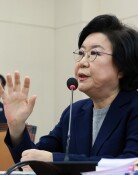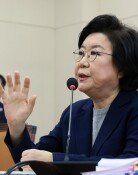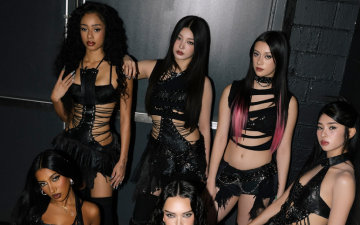Open Uri Party Wins Majority in National Parliament, Gets 152 Seats
Open Uri Party Wins Majority in National Parliament, Gets 152 Seats
Posted April. 16, 2004 17:14,
As of 2 a.m. on April 16, the result of the 17th general parliament election showed that the Open Uri Party has secured 152 parliamentary seats among the total 299 seats and succeeding in taking the majority position in the National Parliament. The Grand National Party has secured about 121 seats.
This is the first time for a certain party to win majority in National Parliament since the Democratic Justice Party obtained the majority at the 11th general election back in 1981.
It has been disclosed that the Open Uri Party has won in 129 local electoral districts among a total of 243 districts. The Grand National Party has 100, Millennium Democratic Party has five, United Liberal Democrats has four, Democratic Labor Party has two, United Peoples 21st Century has one, and independent politicians have two assemblymen getting elected among the 243 electorate districts.
In the case of the proportionate assemblymen, among the total 56 seats, Open Uri Party will occupy 23, GNP 21, DLP eight, and MDP four seats respectively with certainty.
Including the proportionate assemblymen, the Democratic Labor Party has appeared to have obtained nine seats in the National Parliament, and the Millennium Democratic Party and United Liberal Democrats obtained nine and four seats respectively. According to this, since the Progressive Party was dismantled in 1960, the progressionists have gradually stepped into the current mainstream of society.
Classified by the places, the Open Uri Party won a victory in Seoul, Seoul metropolitan districts, Chungchung, and Honam regions, and the Grand National Party won in Youngnam and Gangwon regions, showing a distinctive difference in the eastern and western regions of the peninsula.
In the case of female candidates, about 28 candidates in the proportionate representation field, and 10 in the local electorate districts have been confirmed to be elected. It is the first time for assemblywomen to account for more than ten percent of all the seats in the National Parliament.
In addition, with only 95 current assemblymen still serving their current terms and continuing in Parliament, approximately two-thirds of all assemblymen will be replaced.
The number of brand new politicians who will enter politics for the first time in the 17th National Parliament is 187, or 63 percent of the entire parliamentary seats. In the 16th general election, the ratio was 49 percent, 134 out of 273 total number of assemlymen.
The chief of the ULD, Kim Jong-pil, the chief of the MDP, Chough Soon-hyung, MDPs electoral chief, Chu Mi-ae, deputy parliamentary speaker, Kim Tae-sik, the former chief of MDP, Park Sang-cheon, the MDPs party whip, Jung Kyun-hwan, MDPs assemblyman, Kim Sang-hyun, and GNPs assemblyman, Hong Sa-deok and Kim Won-kil, and OUPs assemblyman, Lee Bu-young have all lost their elections. MDPs Chough Soon-hyung has resigned from his seat of party chief on this day.
On the other hand, GNPs assemblyman, Jung Hyung-kuen, one of the closest associates of President Roh, the former chief of the presidential administration coordination department Lee Kwang-jae, MDPs former chief, Han Hwa-kap, and an independent politician, Choi In-ki have been elected.
Young-Chan Yoon yyc11@donga.com





![하버드 의사가 실천하는 ‘뇌 노화 늦추는 6가지 습관’ [노화설계]](https://dimg.donga.com/c/138/175/90/1/wps/NEWS/IMAGE/2026/01/22/133210626.3.jpg)

